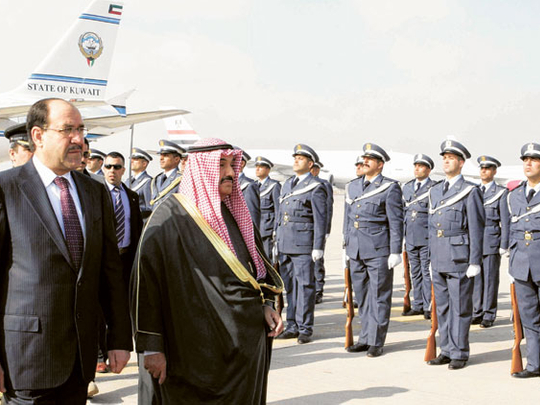
Manama: In a historic visit, Kuwait's Prime Minister Shaikh Nasser Al Mohammad Al Ahmad Al Sabah yesterday discussed with his Iraqi counterpart Nouri Al Maliki in Baghdad "outstanding" issues between the two countries, the Iraqi news agency reported, without giving further explanations.
Shaikh Nasser and Al Maliki held the meeting a short time after the Kuwaiti prime minister arrived in Baghdad in the first visit by a senior Kuwaiti official since August 1990 when the then Iraqi ruler Saddam Hussain invaded his neighbour to the south.
The late Shaikh Sa'ad Al Abdullah Al Sabah was the last Kuwaiti minister to visit Baghdad in 1989.
According to the official news agencies of the two countries, the visit by Shaikh Nasser with a high-profile delegation was to discuss bilateral relations, ways to strengthen them in all fields and "outstanding" issues. An Iraqi official said that the meeting agenda included discussion borders demarcation and the issue of financial compensation.
Kuwait News Agency (KUNA) said that Shaikh Nasser also wanted to congratulate Al Maliki on the formation of the new government. The Iraqi Cabinet was approved by the country's parliament on December 21, after more than nine months of political bitter standoffs pitting the country's leading political formations against one another. Under international sanctions adopted after the liberation of Kuwait in 1991, Iraq still pays five per cent of oil sales into a reparations fund for Kuwait.
Kuwait has received about $13 billion in reparations, but is demanding that Baghdad pay another $22 billion. Kuwait also wants Iraq to return property stolen during the six-month occupation and provide explanations about the fate of hundreds of Kuwaitis who have been missing since the invasion.
Iraq, which has been the target of about 70 UN resolutions since the August 1990 invasion, has been pushing for an end to all of them, arguing that the financial compensations were crippling its development.












